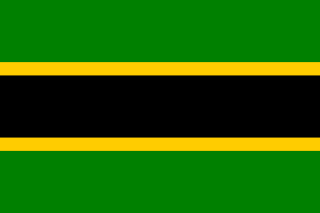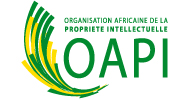This article needs to be updated. The reason given is: 2024 constitution.(May 2024) |
 |
|---|
The Constitution of Togo was formally adopted on 14 October 1992, and last revised in 2019. [1]
This article needs to be updated. The reason given is: 2024 constitution.(May 2024) |
 |
|---|
The Constitution of Togo was formally adopted on 14 October 1992, and last revised in 2019. [1]

Togo, officially the Togolese Republic, is a country in West Africa. It is bordered by Ghana to the west, Benin to the east and Burkina Faso to the north. It is one of the least developed countries and extends south to the Gulf of Guinea, where its capital, Lomé, is located. It is a small, tropical country, which covers 57,000 square kilometres and has a population of approximately 8 million, and it has a width of less than 115 km (71 mi) between Ghana and its eastern neighbour Benin.
The history of Togo can be traced to archaeological finds which indicate that ancient local tribes were able to produce pottery and process tin. During the period from the 11th century to the 16th century, the Ewé, the Mina, the Gun, and various other tribes entered the region. Most of them settled in coastal areas. The Portuguese arrived in the late 15th century, followed by other European powers. Until the 19th century, the coastal region was a major slave trade centre, earning Togo and the surrounding region the name "The Slave Coast".

Politics of Togo takes place in a framework of a presidential republic, whereby the President of Togo is both head of state and head of government. Executive power is exercised by the government. Legislative power is vested in both the government and parliament. After independence, the party system was dominated first by the authoritarian Rally for the Togolese People, and later by its successor party, Union for the Republic.

The World Intellectual Property Organization is one of the 15 specialized agencies of the United Nations (UN). Pursuant to the 1967 Convention Establishing the World Intellectual Property Organization, WIPO was created to promote and protect intellectual property (IP) across the world by cooperating with countries as well as international organizations. It began operations on 26 April 1970 when the convention entered into force. The current Director General is Singaporean Daren Tang, former head of the Intellectual Property Office of Singapore, who began his term on 1 October 2020.

Tanganyika was a sovereign state, comprising the mainland part of present-day Tanzania, that existed from 1961 until 1964. It first gained independence from the United Kingdom on 9 December 1961 as a Commonwealth realm headed by Queen Elizabeth II before becoming a republic within the Commonwealth of Nations a year later. After signing the Articles of Union on 22 April 1964 and passing an Act of Union on 25 April, Tanganyika officially joined with the People's Republic of Zanzibar to form the United Republic of Tanganyika and Zanzibar on Union Day, 26 April 1964. The new state changed its name to the United Republic of Tanzania within a year.

Gnassingbé Eyadéma was a Togolese military officer and politician who was the president of Togo from 1967 until his death in 2005, after which he was immediately succeeded by his son, Faure Gnassingbé.

The national flag of Togo consists of five horizontal stripes, alternating between green and yellow, with a red square bearing a five-pointed white star in the canton. It is one of many African flags that use the pan-African colours of green, yellow, and red. It was designed by Togolese artist Paul Ahyi in 1960, just before its adoption on 27 April of that year, coinciding with Togo's proclamation of independence. When Togo was an autonomous republic within the French Union, it flew a green flag with the French tricolour in the canton and two five-pointed yellow stars, one in the lower hoist and one in the upper fly.

Faure Essozimna Gnassingbé is a Togolese politician who has been the president of Togo since 2005. Before assuming the presidency, he was appointed by his father, President Gnassingbé Eyadéma, as Minister of Equipment, Mines, Posts, and Telecommunications, serving from 2003 to 2005.

Regions are the first-level administrative divisions of Togo. They are subdivided into prefectures, which can be further broken down into communes. Each region has an elected regional government and a capital city that acts as its administrative seat. The regional governments have jurisdiction over some local affairs, but most powers are shared with the national government.

A utility model is a patent-like intellectual property right to protect inventions. This type of right is available in many countries but, notably, not in the United States, United Kingdom or Canada. Although a utility model is similar to a patent, it is generally cheaper to obtain and maintain, has a shorter term, shorter grant lag, and less stringent patentability requirements. In some countries, it is only available for inventions in certain fields of technology and/or only for products. Utility models can be described as second-class patents.

There are a number of languages spoken in Iraq, but Mesopotamian Arabic is by far the most widely spoken in the country. Arabic and Kurdish are both official languages in Iraq.

The Organisation Africaine de la Propriété Intellectuelle or OAPI is an intellectual property organization, headquartered in Yaoundé, Cameroon. The organisation was created by Bangui Agreement of March 2, 1977. The Bangui Agreement was subsequently amended in 1999.

There are 32 Cabinet ministers and 50 Ministers of State in the Cabinet of Uganda.
The national symbols of North Macedonia, as stated in the constitution, are the coat of arms, the flag and the anthem. After the independence of North Macedonia from Yugoslavia, the country made some changes in the national symbols. The flag was changed two times and today's flag includes an eight-ray sun on a red background, while the coat of arms from the Socialist Republic of Macedonia was retained, except the red star which was removed.

The Lisbon Agreement for the Protection of Appellations of Origin and their International Registration, signed on 31 October 1958, ensures that in member countries, appellations of origin receive protection when are protected in their country of origin. It lays down provisions for what qualifies as an appellation of origin, protection measures and establishes an International Register of Appellations of Origin, run by the World Intellectual Property Organization. The agreement came into force in 1966, and was revised at Stockholm (1967) and amended in 1979 and 2015. As of July 2022, 39 states are party to the convention and 1000 appellations of origin has been registered.
The Madrid System, also known as the Madrid Protocol or simply Madrid, is the primary international system for facilitating the registration of trademarks in multiple jurisdictions around the world. It was established pursuant to the multilateral treaties Madrid Agreement Concerning the International Registration of Marks of 1891 and the Protocol Relating to the Madrid Agreement (1989), which has been the sole governing treaty since 2016.
The Copyright law of El Salvador is legal rights to creative and artistic works under the laws of El Salvador. It was implemented in the Decree No. 604 of the Legislative Assembly of El Salvador on 16 of August 1993. This law aims to protect the economic and moral rights of Salvadoran authors and foreigners residing in El Salvador, granted by the mere fact of creating works that are literary, artistic and scientific.

Presidential elections were held in Togo on 22 February 2020. Incumbent president Faure Gnassingbé of the Union for the Republic (UPR) was re-elected for his fourth term with 71% of the vote in the first round. His closest challenger was Agbéyomé Kodjo, a former prime minister and leader of the newly established Patriotic Movement for Democracy and Development, who received 19% of the vote.